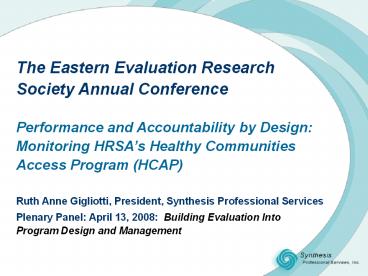The Eastern Evaluation Research Society Annual Conference - PowerPoint PPT Presentation
1 / 8
Title:
The Eastern Evaluation Research Society Annual Conference
Description:
The Eastern Evaluation Research Society Annual Conference ... Improved access to health care for uninsured and underinsured patients ... – PowerPoint PPT presentation
Number of Views:39
Avg rating:3.0/5.0
Title: The Eastern Evaluation Research Society Annual Conference
1
The Eastern Evaluation Research Society Annual
Conference Performance and Accountability by
Design Monitoring HRSAs Healthy Communities
Access Program (HCAP) Ruth Anne Gigliotti,
President, Synthesis Professional
Services Plenary Panel April 13, 2008 Building
Evaluation Into Program Design and Management
2
Healthy Communities Access Program
- Grants to increase access to health care by
- Eliminating fragmented service delivery,
- Improving efficiencies among safety net
providers, and - Encouraging greater private sector involvement.
- 212 Grantee Consortiums with up to 75 Members
- Broad range of activities, related to
- Screening Enrollment
- Pharmacy
- Primary, Ancillary, and Specialty Care
- Case Management
- Health Navigation and Help Lines
3
Tracking and Sharing HCAP Program Information
- Continuous Program Monitoring
- Creating a framework for complex information
- How do the elements of such a broad range of
service scopes contribute to the overall
program? - Accessing what you need to know when you need to
know it - Who are the program Stakeholders and what do they
need to know? - Sharing information even among Grantees
- How can Grantees benefit by their peers
experience?
4
The Challenge Putting It All Together
- Developing Descriptors
- Not an easy task, especially given the complex
nature of the program - Collaboratives with up to 75 members
- Grantees working with a variety of target groups
- Broad range of grantee activities
- Need to know only what we need to know
- Requires a lot of time spent upfront thinking
about and analyzing which data points are most
relevant
5
Sample HCAP Descriptor List
- 5.1 Major Achievements - From the list of common
HCAP goals below, select at least one area of
major achievement for your HCAP Project during
this reference period. - Improved access to health care for uninsured and
underinsured patients - Improved clinical and financial coordination
among community care providers - Improved coordination and information sharing
among community safety-net providers - Improved effectiveness and coordination of health
care provided to uninsured and underinsured
patients - Improved efficiency of providing care to
uninsured and underinsured patients - Improved quality of health care for uninsured and
underinsured patients - Lower cost of care for uninsured and underinsured
patients
6
Sample HCAP Descriptor ListProducts and Tools
- Client Education Materials
- Consortium Agreements
- Data Analysis Method
- Data Collection Tool
- Disease Management Protocol
- Evaluation Methodology
- Financial Management System
- Focus Group Protocol
- Health Assessment Tool
- Insurance Products/Plan
- Job Description
- Medical Information/Records Systems
- Needs Assessment Tool
- Patient Visit Redesign Methodology
- Patient Billing System
- Privacy Policies Procedures (HIPAA Compliant)
- Provider Recruitment Strategies
- Request for Proposal (RFP)
- Resource Directory
- Training Curriculum
- Uniform Quality Measures/Outcomes Indicators
- Volunteer Manual
- Web Site
7
Challenge Thinking ahead to develop useful,
actionable reports
- To gather program outputs and process evaluation
data at regular intervals - To assess early and ongoing progress for
performance improvement - To demonstrate progress to Congress to support
funding decisions - To monitor progress and activity trends over time
- To view data in aggregate form, or by Region, by
State and/or by Project Officer at the click of a
mouse.
8
An Interactive System for Generating Ongoing
Program Data IS Feasible
- Even for a program as complex as HCAP
- Information can be tailored and relevant to
program information needs - Data can be normalized and analyzed by pre-set
program parameters - Data can be generated directly from Grantees with
built-in validation that eliminates
administrative error - A Human Factors-Based interface ensures an
intuitive, user-friendly tool - Using an integrated, collaborative,
interoperable, and scaleable architecture allows
expansion by adding user menus































